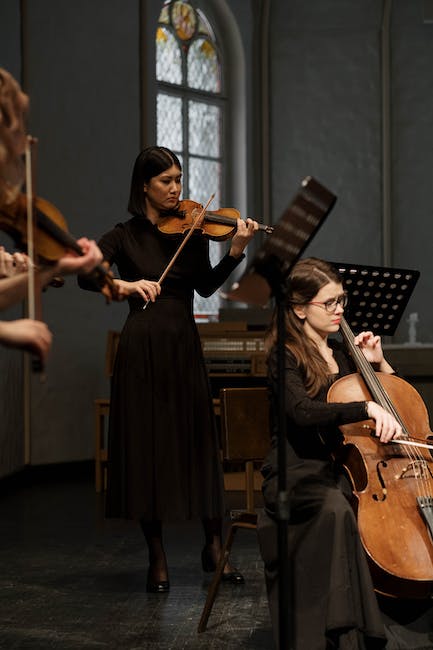In the darkest of times, when the echoes of oppression reverberate relentlessly through the corridors of nations, there emerges an indomitable force that transcends boundaries and kindles the fire of liberation within the hearts of the oppressed. This force is the power of music, a harmonious catalyst capable of inciting revolution, shaking the foundations of authoritarian rule, and paving the way towards freedom and independence. In the annals of history, one extraordinary uprising stands as an astonishing testament to the transcendent influence of melodies interwoven with the aspirations of a nation yearning to break free from the shackles of subjugation. This is the story of “The Singing Revolution,” an extraordinary chapter of human resilience, where the people of Estonia harnessed the might of song to conquer their oppressors, reclaiming their cultural identity and transforming their nation forever. This article explores the remarkable intersection of music and liberation, divulging the profound impact of “The Singing Revolution” and shedding light on the everlasting legacy it has woven into the fabric of humanity.
Harmonious Notes: Music’s Integral Role in the Singing Revolution
Amidst the turbulent times of the Singing Revolution, music emerged as a powerful catalyst for change, uniting a nation and speaking to the hearts of its people. The melodious strains of song became the anthem of hope, resilience, and a collective yearning for freedom. Ranging from traditional folk tunes to newly composed anthems, the diverse repertoire of music served as a unifying force, binding together the voices of tens of thousands of Estonians who stood together in their quest for independence.
Music during the Singing Revolution reached far beyond mere entertainment and transformed into a symbol of defiance against the oppressive Soviet regime. In the face of political persecution, choirs and orchestras formed a vital network for communication, organizing secret song festivals and covert gatherings. With each harmonic note, the music fueled their determination, echoing their desires for self-determination and national identity. It gave voice to the dreams and aspirations of a nation, inspiring courage and resilience in the face of adversity. The power of music proved indomitable, creating a sea of sound waves that reverberated through every corner of the Baltic state, ultimately leading to Estonia’s hard-fought independence.

Melodic Unity: How Choral Singing Bonded a Nation
In the realm of music, there exists something magical that transcends borders and unites people from diverse backgrounds. Choral singing, with its harmonies and melodies, has long been a catalyst for forging bonds and fostering a sense of national unity. It has the power to connect individuals, bringing together a nation in the purest form of artistic expression.
When voices blend in perfect synchronization, creating a tapestry of sound, it creates a rare moment of collective unity. Choral singing has proven to be a communal activity that erases differences and forges connections on a profound level. It provides a platform where diverse voices can intertwine and coexist, fostering respect and understanding among individuals. The beauty of choral singing lies not only in the harmonies created but also in the shared experience of creating something greater than the sum of its parts. Boldly echoing through concert halls and performance spaces, choral singing becomes a symbol of national identity, a testament to the strength and harmonious talents of a unified nation.

Resonating Freedom: Inspiring Acts of Defiance through Song
Music, with its remarkable power to ignite emotions and bridge cultural gaps, has always been a catalyst for change. Throughout history, brave individuals have harnessed the universal language of melody to challenge the status quo, ignite movements, and inspire acts of defiance against oppression. From anthems that echoed through revolution-torn streets to whispered ballads that revived weary souls, these songs of defiance have become timeless symbols of hope and resilience.
At the heart of these inspiring acts of defiance lies the profound ability of song to touch souls, penetrate barriers, and amplify messages of freedom. History has witnessed musicians break the chains of injustice by crafting melodies that emboldened the oppressed and empowered the marginalized. Whether it be the soul-stirring harmonies of protest songs or the fiery verses of rap battles, music has become a potent tool for shedding light on the inequalities and injustices that plague our society.

Symphonic Solidarity: Harnessing the Power of Music for Political Change
In a world filled with political strife and division, music has the extraordinary ability to bring people together. It serves as a universal language that transcends borders, cultures, and ideologies. From the simple beauty of a folk melody to the grandeur of a symphony orchestra, music has the power to ignite our passions, inspire our souls, and unite us in a common cause. Through collective harmony and orchestrated melodies, musicians have long used their art to ignite social and political change.
Music is a powerful catalyst for political transformation. When artists leverage their voices and instruments, they raise awareness of critical issues that demand societal attention. From Bob Dylan’s protest anthems during the Civil Rights Movement to N.W.A’s provocative lyrics shedding light on police brutality, music has the ability to amplify marginalized voices and challenge the status quo. Whether on the stages of massive music festivals or in intimate concert halls, musicians harness the power of their art to foster empathy, foster dialogue, and inspire action. In the face of unrest and injustice, the harmonious sounds of musicians unfettered by oppression have the potential to mobilize communities, spark movements, and create lasting social change.
In Summary
As the final notes of this melodious symphony fade into the realm of memory, we are left awestruck by the power of music. The Singing Revolution, a unique and captivating chapter in the annals of history, serves as a testament to the ability of harmonies to transcend borders and ignite the flames of freedom.
Through the graceful sweep of symphonies, the resolute chants of choirs, and the fervent strumming of guitars, Estonia struck a resounding chord that reverberated far beyond its borders. What began as a peaceful expression of unity and national identity grew into an unstoppable crescendo, ultimately dismantling the shackles of oppression and ushering in waves of independence.
In the heart of this revolution, music took center stage, weaving threads of resilience and solidarity throughout the fabric of society. From the cozy resonance of living rooms to the grandeur of concert halls, Estonians raised their voices against the harsh echoes of authoritarian rule. With every verse they sang, they chipped away at the walls that sought to confine them, reminding us that even in the darkest of times, hope can be found in the beauty of a song.
The Singing Revolution not only united a nation but it also captivated the world, as hearts and minds the world over observed this stirring spectacle of euphonic defiance. Estonia became a living testament to the extraordinary power of music, reminding us that the spirits of freedom and independence can dance to the rhythm of a song.
In this age of division and discord, we can look to the Singing Revolution as a guiding anthem of hope. It teaches us that when voices come together, they possess a potency capable of dismantling even the most entrenched systems of oppression. It dares us to believe in the transformative potential of music, inspiring us to search for our own harmonies that can resonate amidst the chaos.
So let us remember the brave souls who strummed their guitars and belted their ballads, sacrificing their comfort to chart a path towards liberty. Let us remember the everlasting imprint they left in the sheet music of history, reminding us of the harmonious symphony that can be created when chords of freedom are plucked from the strings of human unity.
May the echoes of the Singing Revolution remind us that music, in all its melodic splendor, shall forever be a catalyst for freedom and an anthem for independence.

